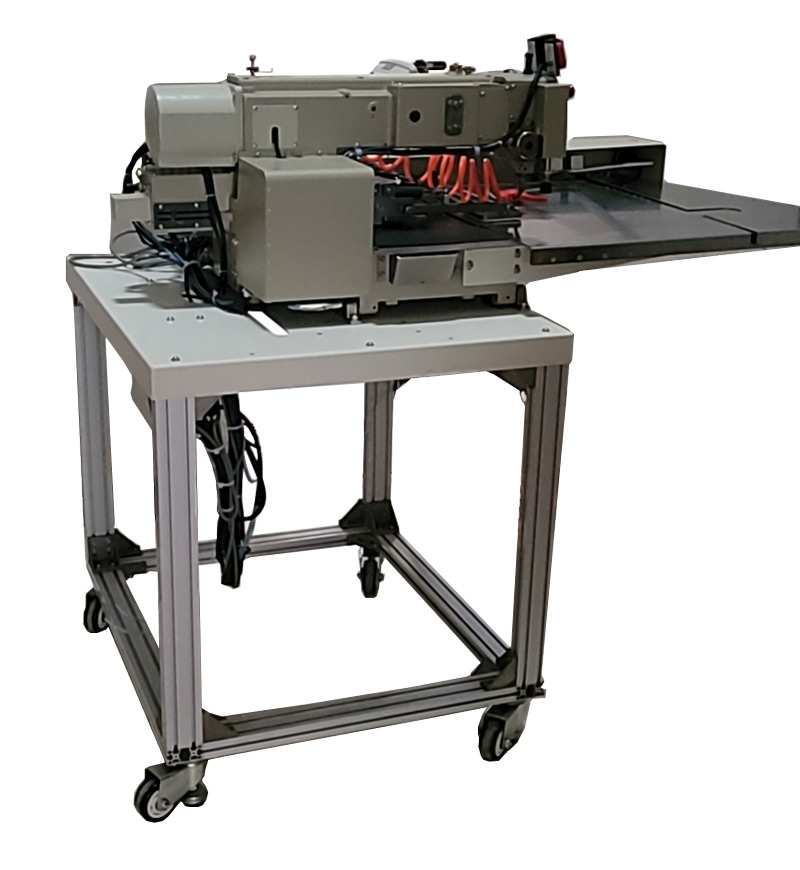
Privacy statement: Your privacy is very important to Us. Our company promises not to disclose your personal information to any external company with out your explicit permission.
2022-08-29
As the world progresses, so does technology. Many factories have already switched to automation in order to increase productivity and lower costs. The same can be done for sewing machines. Automating sewing machines can help improve efficiency and accuracy in production.
There are many reasons why automating sewing machines can be beneficial. For one, it can help improve productivity. Automated sewing machines can work faster and for longer periods of time than human sewers. They are also able to sew more complicated patterns and stitches than humans. This can lead to less waste and more consistent product quality.
In addition, automating sewing machines can help improve accuracy. Machines are less likely to make mistakes than human sewers. This means that there is less chance of defects in the final product. Automation can also help reduce material waste as well as production costs.

Sewing machine automation is the use of technology to automate the sewing process. This can include using computers to control the sewing machine, as well as using sensors and other devices to automate the sewing process. Sewing machine automation can help to improve the quality of sewing, as well as increase productivity.
There are plenty of benefits to investing in sewing machine automation:
The cost of labor is increasing even in China, where most of the world`s clothing is produced. This is due to rising living standards and a shrinking pool of workers as the country ages. To remain competitive, manufacturers are turning to sewing machine automation. Technology has improved significantly in recent years, making sewing machines much more accurate and efficient.
Automation can produce clothes with fewer defects and less waste. It also reduces the need for skilled labor, which is in short supply. Fewer young people are entering the sewing trade, so manufacturers must rely on older workers who are nearing retirement age. Automation can help keep production costs down and ensure that clothing companies can continue to thrive.
In today's business world, automation is key to increased productivity. By automating the sewing machine process, businesses can increase efficiency and output. Automation can help streamline the sewing machine process by reducing the need for manual labor. This can help businesses save time and money while increasing productivity.
Sewing automation has increased productivity by allowing for standard and simple operations. The machine can be set to perform a specific task, such as zigzag or buttonhole stitching, and then left to complete the task. This increases productivity by freeing up the operator to do other tasks.
The average sewing machine is capable of completing a wide variety of tasks, from simple hems to complex quilts. However, many sewers find themselves making mistakes due to the lack of automation in their machines. Sewing machine automation has improved product quality by reducing the number of mistakes that are made during the sewing process.
Automated machines can be set to do as the sewer desires, and they will often provide a warning when a mistake is about to be made. This allows sewers to focus on their work and produce high-quality products without worrying about making mistakes.
Additionally, automated machines often have photoelectric detection which can identify errors and correct them automatically. This helps to ensure that even the most complex projects are completed correctly and with high quality.
Sewing machine automation has increased safety for workers in the textile industry. In 2002, the International Organization for Standardization (ISO) released a standard for automatic sewing machines. The standard includes requirements for safety features, such as emergency stop buttons and guardrails.
Since the release of the ISO standard, many manufacturers have implemented safety features on their automatic sewing machines. These features have helped to reduce injuries in the workplace. In 2013, there were nearly 4,000 reported injuries associated with sewing machines.
This number dropped to 2,600 in 2016. The implementation of safety features on automatic sewing machines has had a positive impact on worker safety in the textile industry. The ISO standard has helped to improve working conditions and reduce the number of injuries reported each year.
A new era of sewing machine automation is making it easier for companies to train new employees. The machines are faster, more precise, and have simpler controls.
Even the most basic operation, such as sewing a button, can be done with just a few clicks. This makes it possible for companies to provide on-the-job training that is shorter and less expensive.
In today's business world, automation is key to staying ahead of the competition. So why haven't some companies invested in automation yet? There are a few primary reasons that some sewing companies have been hesitant to invest in automation technologies.
One reason is the high initial investment cost. Automation technologies can require a big investment upfront, and sometimes it can take a long time to see a return on that investment.
Another reason is that automating certain processes can lead to job loss. If a company automates part of its manufacturing process, for example, it will need fewer workers to man the machines. This can lead to layoffs, and no company wants to be known for putting people out of work.
Finally, some companies may simply not be ready for automation. They may not have the technical expertise on staff, or they may not have updated their facilities to accommodate automated technologies. Whatever the reason, some companies are lagging behind when it comes to investing in automation.
Investing in automation can be a daunting task for companies. Many are afraid of the change that it will bring and the unknown future it may hold. However, there are many benefits to automation that make it worth the investment. With a return on investment (ROI) of usually two years or less, automation can save companies money in the long run.
It also allows for companies to be more agile and adapt to changing markets faster than their competitors. For these reasons, more and more companies are beginning to invest in automation technologies.
For some companies, the idea of spending money to automate their processes is a great one in theory, but they lack the understanding of how much it could actually benefit them. In many cases, these companies haven't seen enough evidence to believe that investing in automation would be worth their while.
One of the main reasons companies hold back on automation is because they see it as a large upfront investment with no guarantee of return. They may also not have the internal resources to make a sound decision about whether or not to pursue automation.
Additionally, some companies are worried about making changes that could potentially disrupt their current workflows. However, there are plenty of examples of companies that have benefited greatly from investing in automation.
In most cases, these benefits far outweigh the initial cost and risks associated with implementing new technologies. For companies who are still on the fence about automation, seeing is believing.
Investing in automation can help companies improve their efficiency and bottom line. Automation can help reduce errors, increase productivity, and free up employees' time so they can focus on higher-level tasks. When done right, automation can be a powerful tool for any business.
Share to:
Send Inquiry

Mr. Alston Chen
Tel:86-769-18902616250
Fax:86-769-88285668
Mobile Phone:+8618902616250
Email:sales02@chuanghuisew.com
Address:26-28 Zhenglu south, chuancha village, Machong Town, Dongguan City, Guangdong Province., Dongguan, Guangdong
Related Products List
Mobile Site


Privacy statement: Your privacy is very important to Us. Our company promises not to disclose your personal information to any external company with out your explicit permission.

Fill in more information so that we can get in touch with you faster
Privacy statement: Your privacy is very important to Us. Our company promises not to disclose your personal information to any external company with out your explicit permission.